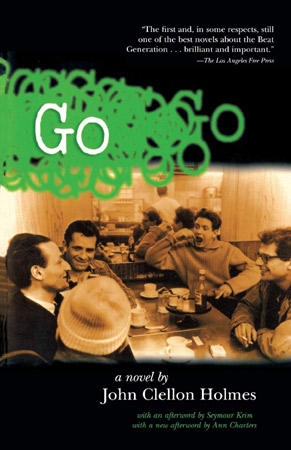 Da Capo Press, 344 pages, paperback, $18.99
Da Capo Press, 344 pages, paperback, $18.99
I first read this novel during the winter of 2002-2003, not long after finishing college. It was an important book to me then because, like his friend Jack Kerouac, John Clellon Holmes successfully mines his own life and experiences and translates them directly to the page. When you are young and full of literary aspirations, this self-mythologizing is especially appealing. And who am I kidding? It still is.
Related Posts
Anyway, unlike Kerouac, Holmes takes a more cautious, sober approach to capturing the early years of the Beats in New York City. As others before me have noted, Kerouac’s earlier works (specifically On The Road) are all about the pursuit of narcissistic joy. That isn’t to say Kerouac and others of that literary movement are devoid of introspection — but still, one might think, if they were to read OTR without any additional context or knowledge, that the lives of Kerouac and Cassady were bliss and joyrides to the very end.
We know that that is not true, and Holmes, even at his young age when writing Go seemed to see the writing on the wall. His youthful indulgences are tempered by his apprehensiveness of the consequences. He sees his friends and acquaintances — vaguely disguised versions of Ginsberg, Kerouac, Cassady, Bill Cannastra, Herbert Huncke, and others — swept up in an underworld where the line between hip and illicit is blurred. In Holmes’s account, sexual affairs, petty theft, drug use, and infidelity can have consequences, legally and emotionally. In Holmes’ world, men like Kerouac and Cassady are not unequivocally heroic, but rather complex and flawed people — still fascinating, but deeply damaged, and very capable damaging others. And Holmes does not spare himself, as his Go alter-ego, Hobbes, is both hurt by and actively hurts his own spouse.
This is not a perfect novel; in fact, I remember enjoying it much more when I first read it 17 long years ago, as I was more willing to digest long, wordy, overly introspective passages that do little to advance the plot (this type of writing is suited to that self-mythologizing I mentioned earlier). Go now seems obviously written by a young writer still finding himself, and I almost wish that in revisiting this novel I had read the abridged version.
All that said, it is still remarkably well-written, and Holmes deserves credit for his strong command of language and ability to create vivid, complex characters with significantly more depth than those of his literary counterparts.